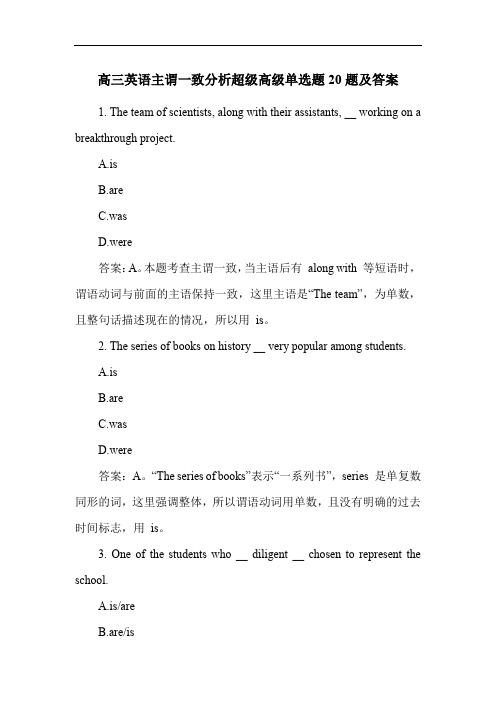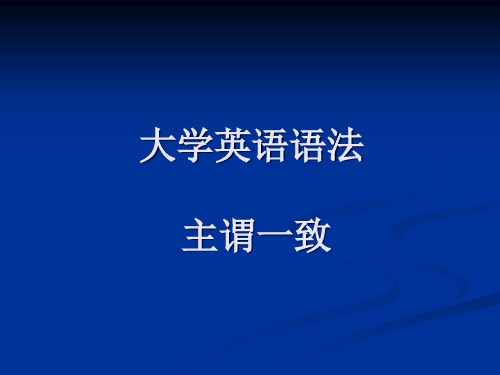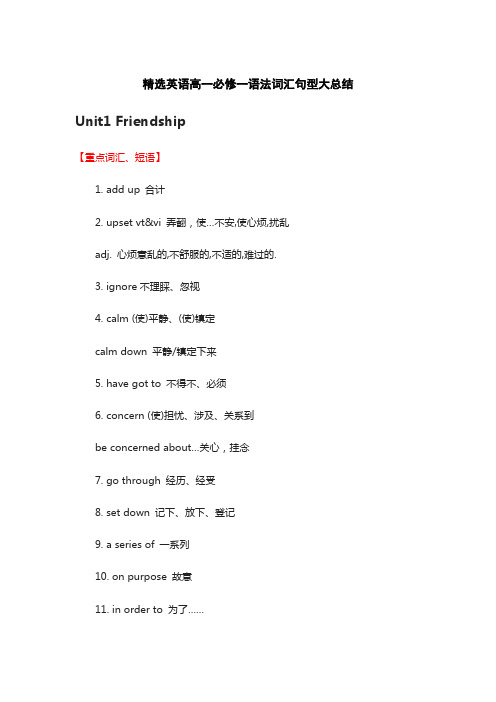aseriesof…作主语谓语动词用单数还是用复数
- 格式:docx
- 大小:6.33 KB
- 文档页数:3

人教版英语必修一各单元短语、语法总结Unit One Friendship一、重点短语1.go through 经历,经受get through 通过;完成;接通电话2. set down 记下,放下3. a series of 一系列4. on purpose 有目的的5. in order to 为了6. at dusk 傍晚,黄昏时刻7. face to face 面对面8. fall in love 爱上9. join in 参加(某个活动);take part in 参加(活动)join 加入(组织,团队,并成为其中一员)10. calm down 冷静下来11. suffer from 遭受12. be/get tired of…对…感到厌倦13. be concerned about 关心14. get on/along well with 与…相处融洽15. be good at/do well in 擅长于…16. find it + adj. to do sth. 发现做某事是…17. no longer / not …any longer 不再…18. too much 太多(后接不可数n.)much too 太…(后接adj.)19. not…until 直到…才20. it’s no pleasure doing sth 做…并不开心21. make sb. sth. 使某人成为…make sb. do sth. 使某人做某事二、语法----直接引语和间接引语概念:直接引语:直接引述别人的原话。
一般前后要加引号。
间接引语:用自己的话转述别人的话。
间接引语在多数情况下可构成宾语从句且不要加引号。
例:Mr. Black said, “ I’m busy.”Mr. Black said that he was busy.变化规则(一)陈述句的变化规则直接引语如果是陈述句,变为间接引语时,用连词that(可省略)引导,从句中的人称、时态、指示代词、时间状语、地点状语都要发生相应的变化。

高三英语主谓一致分析超级高级单选题20题及答案1. The team of scientists, along with their assistants, __ working on a breakthrough project.A.isB.areC.wasD.were答案:A。
本题考查主谓一致,当主语后有along with 等短语时,谓语动词与前面的主语保持一致,这里主语是“The team”,为单数,且整句话描述现在的情况,所以用is。
2. The series of books on history __ very popular among students.A.isB.areC.wasD.were答案:A。
“The series of books”表示“一系列书”,series 是单复数同形的词,这里强调整体,所以谓语动词用单数,且没有明确的过去时间标志,用is。
3. One of the students who __ diligent __ chosen to represent the school.A.is/areB.are/isD.are/are答案:B。
“one of + 复数名词”后接定语从句时,定语从句的谓语动词用复数;“one of the students”为主语,谓语动词用单数,所以前面用are,后面用is。
4. The group of tourists, most of whom __ from different countries, __ enjoying the local scenery.A.is/areB.are/isC.is/isD.are/are答案:B。
“most of whom are from different countries”是定语从句修饰“tourists”,所以定语从句谓语动词用are;“The group”为主语,强调整体,谓语动词用单数is。


高中语法----主谓一致的概述英语中,谓语动词必须和主语的人称和数一致,这就叫主谓一致。
主谓一致有三个基本原则:语法形式上一致,语言内容上一致(意义一致),谓语动词和紧挨着位于其前的主语一致(即就近一致)。
下面从几个方面对主谓一致进行归纳。
一、如果主语是单数、动词不定式(短语)、动名词(短语)、从句或不可数名词时,谓语动词用单数。
复数主语则用复数动词。
如:1.He likes bananas.2.To be a scientist is my dream.3.Watching TV too much is bad for your eyes.4.Persuading him to join us seems really hard.5.That tom has gone abroad makes us all surprised.6.News comes that his father is going to our school.二、由and构成的词1.主语由and或both…and 连接,谓语动词用复数。
但如果and连接的两个词是指同一个人,同一个事物或同一个概念,谓语用单数。
如:a cart and horse(一套马车) a knife and fork(一副刀叉)black and white(黑白花色的) coffee and milk(牛奶咖啡)early to bed and early to rise(早起早睡) going to bed early and getting up early(早起早睡) ham and egg(鸡蛋汉堡)how and why(怎样为什么)ink and pen(笔墨) iron and steel(钢铁)law and order(法治/治安)the bread and butter(奶油面包)the hammer and sickle(锤子和镰刀图案) the needle and thread(针线)the singer and dancer(这位歌唱家兼舞蹈家) time and tide(岁月)truth and honesty(真诚) to try and fail(试过而失败)salt and water(盐水) war and peace(战争与和平)when and where(何时何地)等作主语时,谓语用单数。

精选英语高一必修一语法词汇句型大总结Unit1 Friendship【重点词汇、短语】1. add up 合计2. upset vt&vi 弄翻,使…不安,使心烦,扰乱adj. 心烦意乱的,不舒服的,不适的,难过的.3. ignore不理睬、忽视4. calm (使)平静、(使)镇定calm down 平静/镇定下来5. have got to 不得不、必须6. concern (使)担忧、涉及、关系到be concerned about…关心,挂念7. go through 经历、经受8. set down 记下、放下、登记9. a series of 一系列10. on purpose 故意11. in order to 为了……12. at dusk 在黄昏时刻13. face to face 面对面地14. no longer/not…any longer 不再……15. settle 安家、定居、停留16. suffer 遭受、忍受、经历17. suffer from 遭受、患病18. recover 痊愈、恢复、重新获得19. get/be tired of 对……厌烦20. pack 捆扎,包装/包裹21. pack (sth) up 将(东西)装箱打包22. get along with 与……相处23. fall in love 爱上24. disagree 不同意25. join in 参加【重点句型】1. It was the first time in a year and a half that I had seen the night face to face. (从句时态用完成时)这是我一年半以来第一次目睹夜晚。
2. I wonder if it’s because I haven’t been able to be outdoors for so long that I’ve grown so crazy about everything to do with nature.(强调句)我不知道这是不是因为我长久无法出门的缘故,我变得对一切与大自然有关的事物都无比狂热。

高中英语名词短语练习题40题带答案1. There is ______ interesting books on the shelf. I can't wait to read them.A. a series ofB. a piece ofC. a kind ofD. a set of答案解析:A。
在这个句子中,“a series of”表示“一系列的”,后面接可数名词复数books,符合句子语境,表示书架上有一系列有趣的书。
“a piece of”通常用于不可数名词,如“a piece of paper”(一张纸);“a kind of”表示“一种”,语义不符;“a set of”表示“一套”,在这里没有“a series of”合适。
2. She bought ______ new shoes yesterday. They are very beautiful.A. a pair ofB. a couple ofC. a group ofD. a bunch of答案解析:A。
“a pair of”用于表示成双成对的东西,如鞋子、袜子等,这里说她买了一双新鞋,所以用“a pair of”。
“a couple of”表示“几个”,“a group of”表示“一群”,“a bunch of”表示“一束”,都不能用来形容鞋子。
3. The scientist has made ______ important discoveries in recent years.A. a number ofB. a great deal ofC. a littleD. a few of答案解析:A。
“a number of”后接可数名词复数,表示“许多”。
句中“discoveries”是可数名词复数,“a number of”符合语境。
“a great deal of”后接不可数名词;“a little”后接不可数名词;“a few”表示“几个”,后面直接接可数名词复数,不需要加“of”。
主谓一致英语中的一致主要包括主语和谓语在人称和单复数上的一致、时态一致、名词和其代词一致;谓语动词的形式必须随着主语单复数形式的变化而变化;高考英语中主要以完形填空和语法填空的形式,同时可能会结合其他语法点比如非谓语动词和复合句等来考查;一、主谓一致的三原则主谓一致一般要遵循三个原则:语法一致原则、意义一致原则和就近原则;(一)语法一致原则主语和谓语通常是从语法形式上取得一致,即主语是单数形式,谓语动词也采用单数形式;主语是复数形式,谓语动词也采用复数形式;Jolin has made great success with so many years going on.Jolin是单数形式,谓语动词have也应当用单数形式hasThe Jolins are very fond of singing .the Jolins 指一家人,表示复数,谓语动词be也应当用复数形式are;(二)意义一致原则意义一致原则是指从意义着眼来处理主谓一致问题;有时候主语在形式上是单数形式,但是其意义是负数,谓语动词根据意义而定,采用复数形式;The singer and artist is holding a concert called “land blue”.歌星和大艺术家是同一个人,是单数;The old are very well taken care of in our city.the old 指所有老年人,指一类人,是复数;(三)就近原则就近原则是指谓语动词的变化以靠近谓语动词的主语部分而定;Linlin or you are supposed to get into the hole.You是最靠近谓语动词的主语部分,因此be动词应当用复数形式的are;二、主谓一致的详细讲解(一)代词作主语1.不定代词either, neither, each, one, the other,another以及复合不定代词someone, somebody等作主语,谓语动词用单数;Someone has parked the car on the street.One is from the USA and the other two are from the UK.2.不定代词none作主语时如果指人或者可数的物,指数目,谓语动词单复数均可;如果指不可数名词,指量,谓语动词用单数;None of the students have/has made the mistakes this time.Jimmy has used up all the money. None is left.3.all单独作主语指人时,谓语动词用复数,指物时,谓语动词用单数;All are present at the meeting.All is going on very well.4.由each修饰的名词作主语时,谓语动词用单数;Each位于复数主语后或者句尾作同位语时,不影响谓语动词的单复数形式;Each student has a walkman which helps them improve their listening.They each have won the first prize.=They have won the first prize each.5.neither of和 either of加复数名词或者代词作主语,谓语动词用单复数均可;Either of the story is/are interesting;Neither of us has/have received the postcard.6.such作主语时谓语动词的单复数形式应当根据其意义而定;Such is Stephen Hawing , who has suffered a great deal but achieved so much.Such are the difficulties that we are faced with.7.疑问代词作主语时,谓语动词应当根据其实际意义来判断单复数;Who is the girl over thereWho are the girls over thereWhich is your book, this one or that oneWhich are your books, these or those8.关系代词作主语,其人称和数的变化随先行词而定;参加定语从句讲义;Those who have seen the film please put up your hands.The man who is speaking at the meeting is our chairman.注意三种结构:one of, the only of,not the only of加名词或者代词结构中的定语从句的单复数;参见定语从句讲义;二名词作主语1.集体名词作主语1people, cattle, police只有复数概念的集体名词,谓语动词用复数;2audience, army, class, company, enemy, family, group, public, government,population等集体名词作主语,若作为一个主体,谓语动词用单数;若着眼于成员或者个体,谓语动词用复数;His family was the largest among the whole village.My family are going on a trip this summer.3equipment, furniture, baggage, machinery, clothing, jewellery等表示某一类物品总称的集体名词作主语时,谓语动词用单数;因为这些词是不可数名词;2.单复数同形的词作主语,谓语动词单复数根据其意义而定;means, fish, sheep, deer, crossroads, series, species, works工厂Each means has been tried to solve the problem.There are various of means to solve the problem.1work与workswork表示“工作”,不可数名词,谓语动词永远用单数;work表示“作品”,可数名词,谓语动词用单数;复数形式是works,谓语动词用复数;works表示“工厂”,单复数同形;谓语动词视其句子中的意义而定;2a series of + n 和a species of +n作主语,谓语动词用单数;3.以s结尾的由两部分组成的表示衣物或者工具的名词作主语,谓语动词用复数;如:glasses, shoes, boots, pants, chopsticks, scissors, socks, stockings, trousers 等但是前面有“a pair of”或者“pairs of”修饰时,谓语动词与pair保持一致;4.以s结尾的学科作主语,谓语动词用单数;如:politics, physics, mathematics5.以s结尾的海峡、山脉、群岛和表示时间、距离、长度、价值、金额、重量等的复数名词作主语,常被看做整体,谓语动词用单数;Twenty years has passed.A hundred miles is a long way.三含有修饰语的名词的主谓一致1. a number of和the number ofa number of + 复数名词,表示“很多”,谓语动词用复数;the number of + 复数名词,表示“……的数量”,谓语动词用单数;2.some, plenty of , a lot of, lots of等既可以修饰可数名词,也可以修饰不可数名词,其谓语动词单复数根据所修饰的词而定;Some people work to live while some people live to work.A lot of work is to be done to prepare for the conference.3.主语含有quantity,谓语动词单复数看quantitya quantity of + 可数名词/不可数名词,谓语动词用单数quantities of +可数名词/不可数名词,谓语动词用复数4.most of, the rest, the rest of, part, part of作主语,谓语动词应根据所修饰的名词或者代词而定;Part of his story was not true.Part of the teachers are from England.5.百分数,分数+of+名词作主语,谓语动词根据of后的名词决定单复数;50% of the land is now suitable to grow crops.20% of the people object to the new law.注意一个例外:当用“one in”或者“one out of”表示几分之一时,谓语动词不看of后的名词,只用单数;It is reported that one in ten people suffers from lung cancer.One out of twenty was badly damaged.6.“the majority of + 复数名词”作主语,谓语动词用复数;“the majority”单独作主语,谓语动词既可以用单数也可以用复数;The majority of boys like football.The majority were/was in favor of the proposal.7.“a kind of , this kind of , many kinds of +名词”作主语,谓语动词与of后的名词保持数的一致;kind可以替换成sort,type,form8.“more than one +单数名词”作主语,谓语动词用单数;“more +复数名词+ than one”作主语,谓语动词用复数;More than one person was injured in the accident.More members than one are against the proposal.9.“many a + 单数名词”作主语,谓语用单数;Many a student has failed in the exam.10.“one or two +复数名词”作主语,谓语动词用复数;“a/an + 单数名词 + or two”作主语,谓语动词用单数;One or two days are enough for the work.A day or two is enough for the work.四并列结构作主语的主谓一致1.and 问题1both…and…作主语,谓语用复数;2and连接人名或者人称代词作主语,谓语动词用复数;3两个名词共用一个冠词,用and连接,表示同一人、同一事或者同意概念,谓语用单数;The singer and the dancer are to attend the party. 歌星和舞蹈家都会参加派对;The singer and dancer is to attend the party. 那个歌星兼舞蹈家会参加派对;常见表示同一概念的短语:bread and butter 面包黄油a horse and cart 一套马车a knife and fork 一副刀叉a cup and saucer 一套茶盘}4every + 单数名词 + and + every +单数名词each + 单数名词 + and + each +单数名词no + 单数名词 + and +no +单数名词谓语动词用单数many a +单数名词 + and + many a +单数名词2.either…or… ,neither…nor…,not only…but also…,not…but…,or作主语,谓语动词采取就近原则;Neither you nor your mother is right.You, he, or I am right.Not only he but also I am right.Is either he or you right3.主语后面有with, together with, along with, as well as , like , such as , rather than , besides , including , in addition to , except 等词修饰,谓语动词不受这些词影响;I as well as you am to blame for breaking the window.五动名词短语,不定式短语,名词性从句充当句子主语时,谓语动词用单数;Translating the books is not so easy.To see is to believe.he said is right.注意:1.and连接的不定式、动名词或者从句作主语,谓语动词应当根据句子的单复数概念决定用单数还是复数;When to hold the meeting and where to hold are two things.Going to bed early and getting up early is good habit.2.what引导的主语从句,谓语动词一般用单数形式,但若从句后的表语是负数形式或者从句本身表示复数意义,则谓语动词用复数形式;What they need are books.比较:What they need is more money.六其他情况1.四则运算:相加、相乘,谓语动词单复数均可;相减、相除,谓语动词用单数;Fifteen and fifteen is/are/makes/make/equals/equal/is equal to/are equal to thirty.Five times six is/are/makes/make/equals/equal/is equal to/are equal to thirty.Fifteen minus five is makes/equals/is equal to ten.Fifteen divided by five makes/equals/is equal to three.2.There / Here句型采取就近原则;Here goes a bus.There is a bus.3.倒装句在倒装句中谓语动词应与后面的主语保持一致;On the wall is a photo of my family.Gone are the days when we worked together, laughed together.4.名词化的形容词the + 形容词表示一类人,谓语动词用复数the + 形容词表示一类物,谓语动词用单数The poor are the part of people we help.The beautiful gives happiness to all.注意:the + 国籍类形容词,谓语动词永远用复数The Chinese are like to be together during the Spring Festival.The Chinese are a hard-working people.。
⼀、主谓⼀致 主谓⼀致有许多原则,概括起来不外乎三种⼀致原则,即语法形式⼀致,概念⼀致(语⾔内容上⼀致),毗邻⼀致(谓语动词的单复数形式和紧位于其前的主语⼀致)。
1. 语法形式⼀致 (1)单数主语、单个动词不定式、动名词短语以及句⼦作主语,谓语动词要⽤单数形式。
复数主语,⽤and或both…and 连接的动词不定式短语、动名词短语以及主语从句作主语,谓语动词则⽤复数形式。
例如: 1) The performance was very funny. 2) Serving the people is my great happiness. 3) Whether we'll go depends on the weather. 4) Many natural materials are becoming scarce. 5) Both you and I are students. 6) What I think and what I seek have been fairly reflected in my paper. 注1:在what 引导的主语从句中,如果主语补语是复数时,谓语动词⽤复数形式。
例如: What we have to learn are the pieces of language that produce inversion. 注2:修饰语对主语的数不起影响。
例如: The performance of the first three clowns was very funny. (2)由as well as, with, along with, like, together with, rather than, except, but, including, accompanied by, plus, besides, in addition to, no less than 等引起的结构跟在主语后⾯,不能看作是并列主语,该主语不受这些词组引导的插⼊语的影响,主语如是单数,其谓语动词仍然⽤单数形式。
高中必修一英语知识点总结高中必修一英语知识1Unit One Friendship一、重点短语1.go through 经历,经受get through 通过;完成;接通电话2. set down 记下,放下3. a series of 一系列4. on purpose 有目的的5. in order to 为了6. at dusk 傍晚,黄昏时刻7. face to face 面对面8. fall in love 爱上9. join in 参加(某个活动);take part in 参加(活动)join 加入(组织,团队,并成为其中一员)10. calm down 冷静下来11. suffer from 遭受12. be/get tired of…对…感到厌倦13. be concerned about 关心14. get on/along well with 与…相处融洽15. be good at/do well in 擅长于…16. find it + adj. to do sth. 发现做某事是…17. no longer / not …any longer 不再…18. too much 太多(后接不可数n.)much too 太…(后接adj.)19. not…until 直到… 才20. it’s no pleasure doing sth 做… 并不开心21. make sb. sth. 使某人成为…make sb. do sth. 使某人做某事高中必修一英语知识2Unit two English around the world一、重点短语1. be different from 与…不同be the same as 与…一样2. one another 相互,彼此(=each other)3. official language 官方语言4. at the end of 在…结束时5. because of 因为(后接名词或名词性短语)because 因为(后接句子)6. native speakers 说母语的人7. be based on 根据,依据8. at present 目前;当今9. especially 特别,尤其specially 专门地10. make use of 利用…make the best of 充分利用…11. a large number of 大量的,很多(作主语,谓语动词用复数)the number of …的数量(作主语,谓语动词用单数)12. in fact = actually= as a matter of fact 事实上13. believe it or not 信不信由你14. there is no such thing as… 没有这样的事…15. be expected to …被期待做某事16. play a part/role in … 在…起作用17. make lists of…列清单18. included 包括(前面接包括的对象)Including包括(后接包括的对象)19. command sb. to do sth. 命令某人去做某事command + that 从句(从句用should+V原)20. request sb. to do sth. 要求某人做某事request + that 从句(从句用should+V原)高中必修一英语知识3Unit 3 Travel journal一、重点短语1. travel----泛指旅行journey----指长时间长距离的陆上旅行voyage----指长距离的水上旅行,也可以指乘飞机旅行trip----常指短时间短距离的旅行tour----指周游,巡回旅游,2. prefer to 更加喜欢,宁愿prefer A to B 比起B,更喜欢Aprefer doing to doing 比起做…,宁愿做…prefer to do rather than do 与其做…, 不如…3. flow through 流过,流经4. ever since 自从5. persuade sb. to do sth. 说服某人做某事6. be fond of 喜欢7. insist on doing 坚持做某事insist + that 从句(用should+ V原)8. care about 关心9. change one’s mind 改变想法10. altitude 高度attitude 态度,看法11. make up one’s mind to do下定决心做某事= decide to do = make a decision to do12. give in 让步,屈服give up 放弃13. be surprised to … 对…感到惊奇to one’s surprise 令某人惊讶的是…14. at last = finally = in the end 最终15. stop to do 停下来去做某事stop doing 停止做某事16. as usual 像往常一样17. so…that 如此… 以至于…So + adj + a/an + n. + thatSuch + a/an +adj. + n. + that18. be familiar with 对…熟悉(人作主语)be familiar to 为…所熟悉(物作主语)二、语法:现在进行时表将来现在进行时表将来,表示最近按计划或安排要进行的动作,常见的现在进行时表将来的动词有:come/ go / leave/ arrive / travel / take / stay/ do 等.例:1. I’m coming. 我就来2. what are you doing next Sunday ? 你下个星期天做什么?3. I hear that you are travelling along Mekong River. 我听说你将沿湄公河旅行4. Where are you staying at night? 你们晚上待在哪里/高中必修一英语知识4Unit four Earthquakes一、重点短语1. right away 立刻,马上(= at once = in no time)2. asleep 睡着的;熟睡地(fall asleep 入睡)sleep 睡;睡眠sleepy 犯困的3. it seems that/ as if … 看来好像… ;似乎4. in ruins 成为废墟5. the number of …的数量(谓语动词用单数)a number of 大量(谓语动词用复数)6. rescue workers 营救人员Come to one’s rescue 营救某人7. be trapped 被困8. how long 多长时间how often 多久,指平率how soon 还要多久(用于将来时当中,用in+时间段回答)9. hundreds of thousands of 成千上万的10. dig out 挖出11. shake----泛指“动摇,震动”,常指左右、上下动摇,也可以指人“震惊,颤抖”例:1. She felt the earth shaking under him.2. She was shaken with anger.quake---- 指较强烈的震动,如地震例: The building quaked on its foundationTremble---- 指人由于寒冷、恐惧、不安等引起的身体的抖动或声音的颤抖例:Suddenly I saw her lips begin to tremble and tears begin to flow down her cheeks.Shiver---- 多指寒冷引起的颤抖、哆嗦例:A sudden gust of cold wind made me shiver.12. rise (rose—risen)---- vi, 上升;升起,无被动语态;give rise to 引起Raise(raised—raised)---- vt, 举起;筹集;养育Arise ( arose—arisen)----vt, 出现(常指问题或现象)13. injure---- 常指因意外事故造成的损伤,也可以指感情上名誉上的伤害例:He was injured in a car accident.harm---- 泛指“伤害,损害”,既可以指有生命的,也可以指无生命的例:1. He was afraid that his fury would harm the child.2. His business was harmed for some reason.hurt---- 既可以指肉体上的伤害,也可以指精神上的伤害例:1. She hurt her leg when she fell.2. He felt hurt at your word.wound---- 一般指枪伤、刀伤等在战场上受的伤例:The bullet wounded him in the arm.14. be prepared for …= make preparations for… 为…做准备15. in one’s honor 向…表示敬意;为纪念Be/ feel honored to do … 做…感到很荣幸16. make /give/ deliver a speech 发言opening speech 开幕词17. give/ provide shelter to …向…提供庇护所seek shelter from…躲避18. happen to + n./ pron. 遭遇,发生happen to do sth. 偶然;碰巧happen ----指偶然发生take place----指事先计划好的事情发生二、语法----定语从句概念:在复合句中,修饰名词或代词的从句叫做定语从句。
▲ series 虽为复数形式,但可以表示单数意义,即单数与复数同形。
series 用作主语时,谓语通常用单数,但在现代英语中有时也用复数。
如:The lecture series falls [fall] naturally into three parts. 该系列讲座可自然分成3 部分。
▲a series of 用作主语时,谓语也可以用单数或复数。
如:——用单数的例子A series of robberies has shaken up residents of the neighborhood. 接连发生的抢劫案使这一地区的居民深感不安。
A series of bribery scandals has cut a swathe through the government. 一连串的受贿丑闻使政府遭到重创。
A new series of wildlife programmes has started on Monday evenings. 一档新的野生动物节目已经在每周一晚上播出。
——用复数的例子A whole series of problems have arisen one after another. 一系列的问题接连出现了。
A series of attacks have sharpened fears of more violence. 一连串的袭击事件增加了人们对发生更多暴力事件的担心。
A series of missed opportunities have badly weakened the company. 一系列的机会错失大大削弱了该公司的实力。
——用单数或复数均可的例子A series of attacks has [have] sharpened fears of more violence. 一系列的攻击使人们更
加担心会有更多的暴力。
I have to attend a series of
meetings which has [have] nothing to do with my work. 我不得不要参加一系列与我的工作无关的会议。
▲如果其前有明显的表示复数意义的修饰语,则其后要用复数谓语,比较:A series of lectures is scheduled. 一个系列演讲已安排好了。
Two series of lectures are scheduled. 两个系列演讲
已安排好了。
This new series is beginning next week. 这个新连续剧下周开始播映。
These new series are beginning next week. 这些新连续剧下周开始播映。